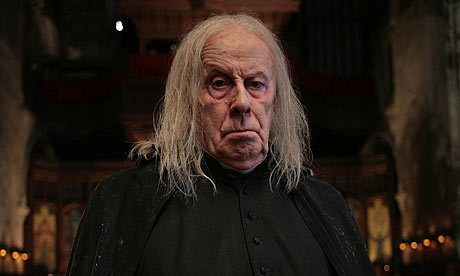I know that by now most of you are thinking that we’re done with The Tempest, and most of you are going to just straight up ignore me, and that’s totally fine. I get that. I understand. Why would anyone want to stay too long on Shakespeare’s last play?
Unfortunately for you all, I am one of those Champion Grudge Holders.
By the end of The Tempest, Prospero has told us all about how he has PHENOMENAL COSMIC POWER, which he has spent at least the last twelve years perfecting the art of, and yet he spends three hours messing around with a few of the people who he wants revenge on, and then promptly decides that that is quite enough revenge, thank you very much. Then he goes on to give up his magic. Just like that. More than twelve years of his life gone in an instant, all in the name of forgiveness. Even if we were to stop and speculate on the idea that Prospero could easily be in the neighborhood of sixty, seventy, eighty years old, that still means that he tosses aside at least an eighth of his life, which seems to be, in the lightest terms I can stand to type and not think of myself as being too kind, “very, very stupid of him to do.”
The thing that really, really makes this decision to be a moment of PHENOMENAL COSMIC STUPID is that there is absolutely nothing that establishes that in order for him to have forgiveness and mercy in his heart for those who have wronged him, he’ll have to give up his magic.
So, because I have more rage in my heart than Prospero has magic left, I’m going to list out a few things that Prospero could have done with his magic after the events of the play. Maybe I’m just cruel. Maybe I just have an irreconcilable hatred for people who wield PHENOMENAL COSMIC POWER and then piss it away on meaningless horsepucky like ‘the greatest magic is friendship and forgiveness’ or ‘hahah! I can level cities or cure plague, I shall move the Pope’s cup!’. If Prospero had any sense in his magical body, he would have done something of consequence with his magic.
In case you’re wondering, yes, this is the Cracked style article-post that details what I hope will be the joint fanfiction project between Alex and I - The Tempest 2: Electric Boogaloo (working title).
---
1 - Proven to the World that Magic is Real
We as the audience have already bought into the idea that Prospero is magical, and has magical powers. If nothing else, he has Aeriel. If Prospero’s only magical power was the oddly specific and highly useful ability to get Aeriel out of a tree, he still has that magic and a spirit to do his bidding. This is absolutely huge.
Although The Tempest is set in this nebulous chrono-space where all we know is that an English audience was watching something that was supposed to be happening to Italians from God Knows When, the fact of the matter is that Magic has been a huge part of European history since pretty much the first time someone had a question that no one else had a reasonable answer to, and it was pretty much always a big, bad thing. And yet in spite of this being a big bad thing, no one ever really came forward with a world paradigm shifting display of PHENOMENAL COSMIC POWER.
Prospero could have at least proven to the world that magic is real in one of any number of public displays of HOLY CRAP THIS GUY IS MAGICAL when he got back. He could do something relatively mundane, like turn some water into wine, which would have maybe let the world shift into thinking that maybe magic could be a good thing, because everyone loves wine and most people love biblical references. Serve God by aspiring to emulate him not just in deed or in manner, but in power! Although, thinking about it…
2 - Destroy Some Cities
A lot of people probably wouldn’t be too happy about that idea. Europe did just spend several hundred years hating on little old ladies with funny mushrooms under the pretense of “only God should have the power to do things like that!” so maybe Prospero would need to go on a weird sort of offense-defense combo and prove to the world that magic was real with something a little more terror-inspiring. He’s already shown that he’s more than willing to just mess with some people. Why doesn’t he just put the Vatican to sleep while he invites dignitaries from Florence to come watch him level Venice with an Earthquake?
I mean, hypothetically speaking, that has to be the sort of thing that would make everyone who hears about it completely lose control of their bowels. And for extra doses of Grim-Dark, the whole step of “putting the Vatican to sleep” isn’t just to mess around and make a callback to him putting his daughter to sleep whenever she got annoying - it would resonate with people as a whole thing about God being asleep. There’s no hope for you now, world! God’s mortal agents can do nothing to protect you from this sort of power! At least, they’ve shown no such capability yet. Such fools are they, to think that they can stand before such power as belongs to the mighty Prospero!
3- Raise an Army of the Undead
Even if he just wants to be Duke again, there’s going to be people who aren’t happy with the things that he’s done in the past, like not really be a Duke, and the whole magic thing, so he’s going to need some elite protection. Enter zombies. Prospero claims to have the ability to raise the dead, I say he put up or shut up. Build yourself an army of the damned, Prospero. You’ll need it to fight off all those people who really think of you as a monster for “abusing your power” after levelling Venice with an Earthquake. Hey! That’s where you can get your first wave of zombies! Venice! Such doge, much zombie, so wow.
It gets even more ridiculous when you realize that unless another Mega Wizard like Prospero happened to show up somewhere, the combined forces of the world would march on wherever Prospero damn well pleases to make his new headquarters in those old-timey marching lines. Know what those look like to a Lich King? More zombies!
4- Declare Himself Benevolent Dictator of the World
Sitting upon a throne of skulls at the top of his crystal tower, surrounded on all sides by what remains of every army that dared to stand against him, now his undead slaves, Prospero sits unchallenged. Magic is real, and its consequences upon the world are now known.
Cartographers no longer place Italy on the map. It is a dark and barren place for many years, thought lost. Prospero has delved into the sanctity of his books once more. Many question their faith. What kind God would allow a man like Prospero into this world?
Seven years pass after the last Christian Army falls before Prospero’s might before he makes himself known to the world once more. A roaring tempest whirls across Europe, earthquakes rock Africa, and the rain in Asia seems to not even want to stop.
Then, all at once, these troubles fade into nothing, replaced with the sunshine of a bright new day, and Prospero’s voice echoing throughout the world. “Fear not, for I bring unto you tidings of great joy, which shall be to all people.”
“No longer will humanity be bound by that which had for so long prescribed our fates, and a new era of joy and peace shall reign throughout the world. I, Prospero, shall lead you.”
5- Actually Use Magic For Good
Or he could skip right to this step and just go about doing things like, curing the plague, teaching people to wash their hands before eating or tending to a patient, and generally being awesome and good with magic. Sure, it’s not as fun to write as its own sequel, but he could have said he was going to do this at the end of The Tempest and it would have still made more sense and effective use of the time he’d spent practicing magic than just saying, “Nope, done, Aeriel, get us home and then you’re free.”
---
1 of 5




